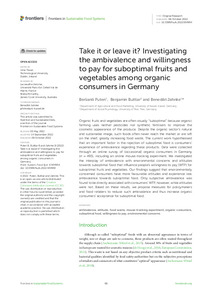Datum
2022-10-06Schlagwort
580 Pflanzen (Botanik) 630 Landwirtschaft, Veterinärmedizin DeutschlandBiologische LandwirtschaftLebensmittelabfallAbfallvermeidungVerbraucherverhaltenOnline-BefragungKaufverhaltenMetadata
Zur Langanzeige
Aufsatz

Take it or leave it? Investigating the ambivalence and willingness to pay for suboptimal fruits and vegetables among organic consumers in Germany
Zusammenfassung
Organic fruits and vegetables are often visually “suboptimal” because organic farming uses neither pesticides nor synthetic fertilisers to improve the cosmetic appearance of the produce. Despite the organic sector's natural and sustainable image, such foods often never reach the market or are left on the shelf, greatly increasing food waste. The current work hypothesised that an important factor in the rejection of suboptimal food is consumers' experience of ambivalence regarding these products. Data were collected through an online survey of (occasional) organic consumers in Germany (n = 493), including an online mouse-tracking experiment. We investigated the interplay of ambivalence with environmental concerns and attitudes towards suboptimal food that influence people's willingness to pay (WTP) for suboptimal fruits and vegetables. Our findings suggest that environmentally concerned consumers have more favourable attitudes and experience less ambivalence towards suboptimal food. Only subjective ambivalence was found to be directly associated with consumers' WTP, however, while attitudes were not. Based on these results, we propose measures for policymakers and food retailers to reduce such ambivalence and thus increase organic consumers' acceptance for suboptimal food.
Zitierform
In: Frontiers in Sustainable Food Systems Volume 6 (2022-10-06) eissn:2571-581XFörderhinweis
Gefördert durch den Publikationsfonds der Universität KasselZitieren
@article{doi:10.17170/kobra-202210277043,
author={Puteri, Berlianti and Buttlar, Benjamin and Jahnke, Benedikt},
title={Take it or leave it? Investigating the ambivalence and willingness to pay for suboptimal fruits and vegetables among organic consumers in Germany},
journal={Frontiers in Sustainable Food Systems},
year={2022}
}
0500 Oax
0501 Text $btxt$2rdacontent
0502 Computermedien $bc$2rdacarrier
1100 2022$n2022
1500 1/eng
2050 ##0##http://hdl.handle.net/123456789/14220
3000 Puteri, Berlianti
3010 Buttlar, Benjamin
3010 Jahnke, Benedikt
4000 Take it or leave it? Investigating the ambivalence and willingness to pay for suboptimal fruits and vegetables among organic consumers in Germany / Puteri, Berlianti
4030
4060 Online-Ressource
4085 ##0##=u http://nbn-resolving.de/http://hdl.handle.net/123456789/14220=x R
4204 \$dAufsatz
4170
5550 {{Deutschland}}
5550 {{Biologische Landwirtschaft}}
5550 {{Lebensmittelabfall}}
5550 {{Abfallvermeidung}}
5550 {{Verbraucherverhalten}}
5550 {{Online-Befragung}}
5550 {{Kaufverhalten}}
7136 ##0##http://hdl.handle.net/123456789/14220
<resource xsi:schemaLocation="http://datacite.org/schema/kernel-2.2 http://schema.datacite.org/meta/kernel-2.2/metadata.xsd"> 2022-10-27T11:09:21Z 2022-10-27T11:09:21Z 2022-10-06 doi:10.17170/kobra-202210277043 http://hdl.handle.net/123456789/14220 Gefördert durch den Publikationsfonds der Universität Kassel eng Namensnennung 4.0 International http://creativecommons.org/licenses/by/4.0/ ambivalence attitude food waste mouse-tracking experiment organic consumers suboptimal food willingness to pay environmental concerns 580 630 Take it or leave it? Investigating the ambivalence and willingness to pay for suboptimal fruits and vegetables among organic consumers in Germany Aufsatz Organic fruits and vegetables are often visually “suboptimal” because organic farming uses neither pesticides nor synthetic fertilisers to improve the cosmetic appearance of the produce. Despite the organic sector's natural and sustainable image, such foods often never reach the market or are left on the shelf, greatly increasing food waste. The current work hypothesised that an important factor in the rejection of suboptimal food is consumers' experience of ambivalence regarding these products. Data were collected through an online survey of (occasional) organic consumers in Germany (n = 493), including an online mouse-tracking experiment. We investigated the interplay of ambivalence with environmental concerns and attitudes towards suboptimal food that influence people's willingness to pay (WTP) for suboptimal fruits and vegetables. Our findings suggest that environmentally concerned consumers have more favourable attitudes and experience less ambivalence towards suboptimal food. Only subjective ambivalence was found to be directly associated with consumers' WTP, however, while attitudes were not. Based on these results, we propose measures for policymakers and food retailers to reduce such ambivalence and thus increase organic consumers' acceptance for suboptimal food. open access Puteri, Berlianti Buttlar, Benjamin Jahnke, Benedikt doi:10.3389/fsufs.2022.934954 Deutschland Biologische Landwirtschaft Lebensmittelabfall Abfallvermeidung Verbraucherverhalten Online-Befragung Kaufverhalten publishedVersion eissn:2571-581X Frontiers in Sustainable Food Systems Volume 6 false 934954 </resource>
Die folgenden Lizenzbestimmungen sind mit dieser Ressource verbunden:


